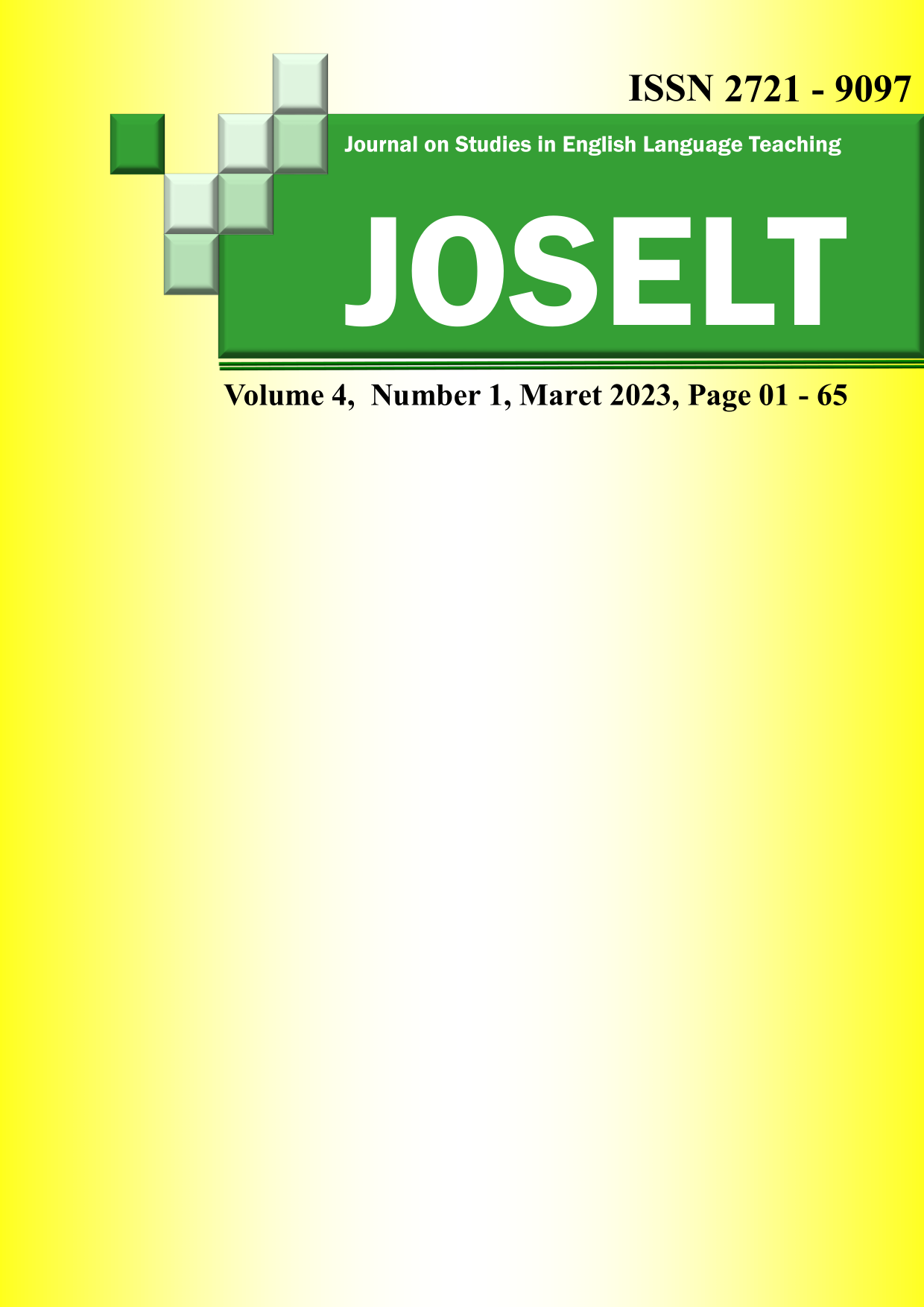THE STUDENTS’ PERCEPTION OF WHATSAPP MESSENGER AS E-LEARNING FOR ENGLISH LANGUAGE IN NINTH GRADE OF SMP YLPI P MARPOYAN
Keywords:
education, perception, application, e-learningAbstract
The perception of WhatsApp as an E-Learning is expected to simplify the students to learn English because WhatsApp has many features that could help students in learning. However, students have different feelings, opinion, feedback and perception about the use of WhatsApp as an E-Learning. The aim of this research is to find out and analyze the students’ perceptions of using WhatsApp as an E-Learning, namely the feeling and the response from the students in learning. This study used quantitative research and the researcher used questionnaire to collect the data. The questionnaire was arranged using Likert Scale. The result of this study shows that the factors which influence the students’ perception of WhatsApp as an E-Learning in SMP YLPI P MARPOYAN are the perceiver consisting of attitudes, motives, experience, and expectation. The target consists of motion, sounds. The situation consists of time, and work setting. The students’ attitudes of using WhatsApp in grade 9 of SMP YLPI P MARPOYAN display the attitudes for the cognitive and affective is contain positives response and feeling.
References
Abun, D., Magallanes, T., & Incarnacion, M. J. (2019). College Students’ Cognitive and Affective Attitude toward Higher Education and Their Academic Engagement. International Journal of English Literature and Social Sciences, 4(5), 1494–1507. https://doi.org/10.22161/ijels.45.38.
Afsyah, S. (2019). WhatsApp Application in English Language Teaching (ELT) Context: Media to Describe People. Utamax : Journal of Ultimate Research and Trends in Education, 1(1), 23–28. https://doi.org/10.31849/utamax.v1i1.2743.
Ainun, N. H., Nurweni, A., & Sholihah, L. (2020). The Students’ Perception of Voice Chatting through WhatsApp in Speaking Class, 1–6.
Amelia, M. (2019). Whatsapp goes to classroom : Using whatsapp to foster students’ speaking skill in speech. International Conference on Education, 4, 153–158. Retrieved from http://scholar.google.com/scholar_url?url=http://ecampus.iainbatusangkar.ac.id/ojs/index.php/proceedings/article/download/2173/1609&hl=en&sa=X&d=8042204847355375274&scisig=AAGBfm0d9VIG2dDPRdSOdd-iEHQiCv63cg&nossl=1&oi=scholaralrt&html=
Arvey, R. D., & Murphy, K. R. (1998). Performance evaluation in work settings. Annual Review of Psychology, 49, 141–168. https://doi.org/10.1146/annurev.psych.49.1.141
Aswan, A. (2020). Memanfaatkan Whatsapp Sebagai Media Dalam Kegiatan Literasi Di Masa Pandemi Covid-19. Fon : Jurnal Pendidikan Bahasa Dan Sastra Indonesia, 16(2), 65. https://doi.org/10.25134/fjpbsi.v16i2.3469
Bismala, L. (2022). The Impact of E-Learning Quality and Students’ Self-Efficacy toward the Satisfaction in the Using of E-Learning. Malaysian Online Journal of Educational Technology, 10(2), 141–150. https://doi.org/10.52380/mojet.2022.10.2.362
Campiong, E., Asri, W. K., & Mantasiah, R. (n.d.). Persepsi Siswa Terhadap Penggunaan Whatsapp dalam Pembelajaran Bahasa Jerman, 268–278.
Carlson, N. R. (2010). Psychology: The Science Behavior. Pearson. Dersta, U. N. (n.d.). What Is Organizat ional Behaviour ?
Fatimah, S., & Nurmanik, T. (2020). WhatsApp Media to Improve Students ’ Speaking Skill, 12–21.
Fatma Nurmalita Purnomo. (2022). Edusaintek : Jurnal Pendidikan , Sains dan Teknologi PENGGUNAAN GRUP WHATSAPP SEBAGAI MEDIA PEMBELAJARAN DI SMP NEGERI 1 BERBAH SLEMAN Fatma Nurmalita Purnomo Universitas Negeri Yogyakarta , Indonesia PENDAHULUAN Pembelajaran merupakan aspek kegiatan manu. 9(2), 430–440.
Fauzi, I. (2021). Teaching English Using Whatsapp During Learning From Home: Impacts To Students and Implication To Teachers. LET: Linguistics, Literature and English Teaching Journal, 11(2), 59. https://doi.org/10.18592/let.v11i2.4918
Gon, S., & Rawekar, A. (2017). Effectivity of E-Learning through Whatsapp as a Teaching Learning Tool. 4(June), 19–25. https://doi.org/10.18311/mvpjms/2017/v4i1/8454
Keskin, S. (2022). E-learning experience : Modeling students ’ e-learning interactions using log. 5(1), 1–13.
Kumar Basak, S., Wotto, M., & Bélanger, P. (2018). E-learning, M-learning and D-learning: Conceptual definition and comparative analysis. E-Learning and Digital Media, 15(4), 191–216. https://doi.org/10.1177/2042753018785180
Maharani, E. N., Kusuma, A., Marista, O., Perception, O. S., Tanjungpandan, S., Irfan, I. M., … Marista, O. (2021). Students ’ Perception of Using WhatsApp in Grade 12 of SMKN 3 Tanjungpandan To cite this article : Students ’ Perception of Using WhatsApp in Grade 12 of SMKN 3 Tanjungpandan, 89–106.
Maulina, M., Ladjagang, R., Nasrullah, R., M. Esteban Jr, A., Hastianah, H., & Herianah, H. (2022). Conceptualizing Research Methods Used in Teaching Listening Skill Studies Using Social Media and Technological Tools. Journal of Education and Teaching (JET), 3(1), 69–83. https://doi.org/10.51454/jet.v3i1.140
Mistar, I., & Embi, M. A. (2016). Students’ Perception on the Use of Whatsapp As a Learning Tool in Esl Classroom. Journal of Education and Social Sciences, 4, 1–9.
Perwitasari, E., Fachriya, E., Hasanah, A., & Raya, U. S. (2021). Dueting Whatsapp and Youtube for Improving Students ’ Engagement in Online Learning Mode, (Senarilip V), 5–6.
Pranajaya, H. dan W. (2018). Pemanfaat Aplikasi Whatsapp di Kalangan Pelajar: Studi Kasus di Mts Al Muddatsiriyah dan Mts Jakarta Pusat. Jurnal Orbith, 14(1), 60. Retrieved from https://jurnal.polines.ac.id/index.php/orbith/article/view/1155
Sandybayev, A. (2020). The Impact of E- Learning Technologies on Student ’ s Motivation : Student Centered Interaction in Business Education. 6(1), 16–24.
Saputra, U. R. (2021). Students ’ Sentence Errors on WhatsApp Daily Status : A Literature Review, 1(1), 23–31.
Tirtanawati, M. R., & Salsabila, D. S. (2021). English Students Perception on the Use of Whatsapp Group in Speaking Class. Journal of English Language Teaching, Linguistics, and Literature Studies, 1(1), 1–19. https://doi.org/10.30984/jeltis.v1i1.1528
Yudi Marihot, Sapta Sari, dan A. E. (2022). Buku Metode Penelitian Kualitatif & Kuantitatif. In Jurnal Multidisiplin Madani (MUDIMA): Vol. Vol. 1 (Issue March).

